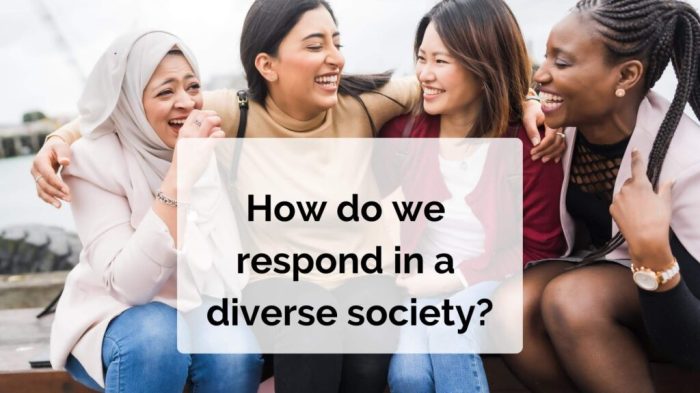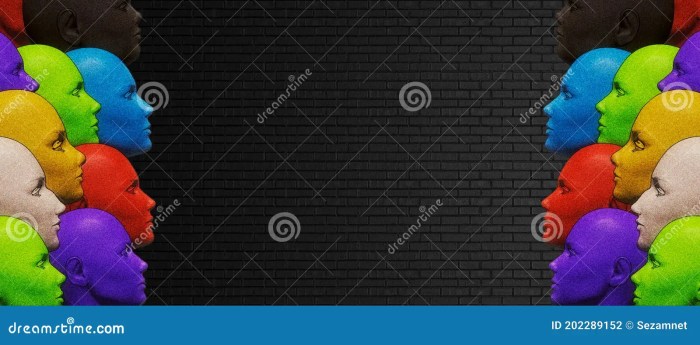Social problems in a diverse society 7th edition – Social Problems in a Diverse Society, 7th Edition delves into the intricate tapestry of societal issues that arise in multicultural environments. This comprehensive guide examines the causes, consequences, and strategies for addressing these challenges, providing a roadmap for fostering inclusive and harmonious communities.
Throughout this edition, readers will explore the impact of social problems on individuals, society as a whole, and the strategies that can be employed to mitigate their effects. With a focus on collaboration, innovation, and evidence-based approaches, this book empowers readers to become active agents of change in creating a more just and equitable society.
Introduction

Social problems are complex and multifaceted issues that affect individuals, families, and communities. In a diverse society, these problems are compounded by the unique challenges and experiences of different groups of people. Social problems can range from poverty and homelessness to discrimination and violence, and they can have a devastating impact on the lives of those who experience them.
The causes of social problems are often complex and interconnected. They can include factors such as economic inequality, social injustice, and discrimination. The consequences of social problems can be equally far-reaching, affecting everything from health and well-being to education and employment.
Impact of Social Problems on Individuals
Social problems can have a profound impact on the mental and physical health of individuals. People who experience poverty, homelessness, or discrimination are more likely to suffer from chronic health conditions, such as heart disease, diabetes, and mental illness. They are also more likely to experience social isolation and loneliness, which can further exacerbate their health problems.
In addition to their physical and mental health, social problems can also have a negative impact on individuals’ access to education, employment, and housing. People who live in poverty are often less likely to have access to quality education and job training programs.
They are also more likely to be unemployed or underemployed, which can make it difficult to afford housing and other basic necessities.
Impact of Social Problems on Society, Social problems in a diverse society 7th edition
Social problems do not only affect individuals; they also have a negative impact on society as a whole. Poverty, homelessness, and discrimination can lead to increased crime, poverty, and social unrest. They can also damage the economy, education system, and healthcare system.
For example, poverty can lead to increased crime rates, as people who are desperate for money may turn to crime as a way to survive. Homelessness can also lead to increased crime rates, as people who are living on the streets are more likely to be victims of violence and theft.
Discrimination can also lead to increased crime rates, as people who are discriminated against may be more likely to turn to violence as a way to express their anger and frustration.
Strategies for Addressing Social Problems
There are a number of different strategies that can be used to address social problems in diverse societies. These strategies can include providing financial assistance to those in need, increasing access to education and job training programs, and improving housing and healthcare services.
It is important to tailor these strategies to the specific needs of the community and to involve community members in the development and implementation of these strategies.
One example of a successful intervention that has been implemented to address social problems is the Earned Income Tax Credit (EITC). The EITC is a tax credit that is available to low-income working individuals and families. The EITC has been shown to reduce poverty and increase the incomes of low-wage workers.
It has also been shown to have a positive impact on children’s health and education outcomes.
Challenges and Opportunities in Addressing Social Problems
There are a number of challenges that can be faced in addressing social problems in diverse societies. These challenges can include a lack of funding, a lack of political will, and a lack of community engagement. It is important to overcome these challenges in order to effectively address social problems and improve the lives of those who are affected by them.
Despite the challenges, there are also a number of opportunities for collaboration and innovation in addressing social problems. These opportunities can include partnerships between government agencies, community organizations, and the private sector. They can also include the use of new technologies and approaches to address social problems.
Quick FAQs: Social Problems In A Diverse Society 7th Edition
What are the most common social problems faced by diverse societies?
Some of the most common social problems faced by diverse societies include poverty, inequality, discrimination, social isolation, and crime.
How do social problems impact individuals?
Social problems can have a significant impact on individuals, leading to mental and physical health issues, social isolation, and discrimination. They can also affect access to education, employment, and housing.
What are some effective strategies for addressing social problems in diverse societies?
Effective strategies for addressing social problems in diverse societies include community-based interventions, government policies, and educational programs. These strategies should focus on promoting social inclusion, reducing inequality, and empowering individuals and communities.

